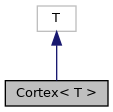#include <evo/cortex.h>
Inheritance diagram for Cortex< T >:

Detailed Description
template<class T = MapList<String,SharedPtr<PureBase> >>
class evo::Cortex< T >
A Map with a collection of independent abstract context items.
- This creates a kind of modular plug-in architecture, where items (modules or contexts) in the the Cortex may be accessed without depending on all the concrete types stored in it
- Expand further by adding "hook" methods to the base interface, where you can apply design patterns like Observer, Visitor, Mediator, etc
- This basically wraps and inherits a Map container, where each value is a SharedPtr to an abstract base class such as PureBase
- Though you can use the Map interface, the Cortex interface is preferred:
- See also alternative approach with: CortexModuleBase
- Template Parameters
-
T Map type to use, values must be a SharedPtr<PureBase>(or SharedPtr to derived type, or at least have a virtual destructor) – defaults to MapList using String keys
- Examples
This example shows a couple modules store in a Cortex, one of which has a dependency on the other.
#include <evo/cortex.h>
#include <evo/io.h>
using namespace evo;
// Define module "foo"
static const char* MODULE_FOO = "foo";
struct ModuleFoo : PureBase {
void foo() {
// ...
}
};
// Define module "bar"
static const char* MODULE_BAR = "bar";
struct ModuleBar : PureBase {
// Move implementation to a source (.cpp) file to decouple the dependency on ModuleFoo
void bar(Cortex<>& modules) {
modules.get_create<ModuleFoo>(MODULE_FOO).foo();
}
};
int main() {
Cortex<> modules;
modules.reserve(2);
try {
// Uncomment to create modules in advance, otherwise created on demand
//modules.create<ModuleFoo>(MODULE_FOO);
//modules.create<ModuleBar>(MODULE_BAR);
// Call ModuleBar method
modules.get_create<ModuleBar>(MODULE_BAR).bar(modules);
} EVO_CATCH(return 1);
return 0;
}
This example shows an interface with an event/hook: event_thing()
#include <evo/cortex.h>
#include <evo/maplist.h>
#include <evo/io.h>
using namespace evo;
struct ModuleBase : PureBase {
// Hook for when the "thing" happens
virtual void event_thing() = 0;
};
// Define MyCortex type using ModuleBase interface
// Define module "foo"
static const char* MODULE_FOO = "foo";
struct ModuleFoo : ModuleBase {
void event_thing() {
}
};
int main() {
MyCortex modules;
// Create module "foo"
modules.create<ModuleFoo>(MODULE_FOO);
// Notify each module that the "thing" is happening
for (MyCortex::IterM iter(modules); iter; ++iter)
iter->value()->event_thing();
// Notify again using C++11 loop (if supported)
for (auto& mod : modules)
mod.value()->event_thing();
)
return 0;
}
Public Types | |
| typedef T | MapType |
Map type (from T) More... | |
| typedef Cortex< T > | This |
| This type. More... | |
| typedef T::Value::Item | ValueBase |
| Value base type, normally PureBase. More... | |
Public Member Functions | |
| Cortex () | |
| Constructor. More... | |
| template<class ItemT > | |
| This & | create (const Key &key) |
| Create item for key, if needed. More... | |
| template<class ItemT > | |
| ItemT & | get_create (const Key &key) |
| Get stored item using key, create if needed. More... | |
| template<class ItemT > | |
| ItemT * | getptr (const Key &key) |
| Get stored item pointer using key (mutable). More... | |
| template<class ItemT > | |
| const ItemT * | getptr_const (const Key &key) const |
| Get stored item pointer using key (const). More... | |
Member Typedef Documentation
◆ MapType
◆ This
◆ ValueBase
Constructor & Destructor Documentation
◆ Cortex()
|
inline |
Constructor.
Member Function Documentation
◆ create()
|
inline |
Create item for key, if needed.
- If the item doesn't exist this creates it, otherwise this is a no-op
- Template Parameters
-
ItemT Item type for underlying key
- Parameters
-
key Key to find item
- Returns
- This
◆ get_create()
|
inline |
Get stored item using key, create if needed.
- If the item doesn't exist this creates it first
- This uses
dynamic_castto cast the base type to the requested type- This has some runtime overhead, and throws
std::bad_castif the cast fails - To use
static_castinsteaddefine EVO_CORTEX_DYNAMIC_CAST 0(before including this)
- This has some runtime overhead, and throws
- Caution: Results are undefined if the concrete type (
ItemT) doesn't match the current object for key
- Template Parameters
-
ItemT Item type for underlying key
- Parameters
-
key Key to find item
- Returns
- Reference to item
◆ getptr()
|
inline |
Get stored item pointer using key (mutable).
- This uses
dynamic_castto cast the base type to the requested type- This has some runtime overhead, and throws
std::bad_castif the cast fails - To use
static_castinsteaddefine EVO_CORTEX_DYNAMIC_CAST 0(before including this)
- This has some runtime overhead, and throws
- Caution: Results are undefined if the concrete type (
ItemT) doesn't match the current object for key
- Template Parameters
-
ItemT Item type for underlying key
- Parameters
-
key Key to find item
- Returns
- Pointer to item found, NULL if not found
◆ getptr_const()
|
inline |
Get stored item pointer using key (const).
- This uses
dynamic_castto cast the base type to the requested type- This has some runtime overhead, and throws
std::bad_castif the cast fails - To use
static_castinsteaddefine EVO_CORTEX_DYNAMIC_CAST 0(before including this)
- This has some runtime overhead, and throws
- Caution: Results are undefined if the concrete type (
ItemT) doesn't match the current object for key
- Template Parameters
-
ItemT Item type for underlying key
- Parameters
-
key Key to find item
- Returns
- Pointer to item found, NULL if not found
The documentation for this class was generated from the following file:
- evo/cortex.h
 1.8.13
1.8.13